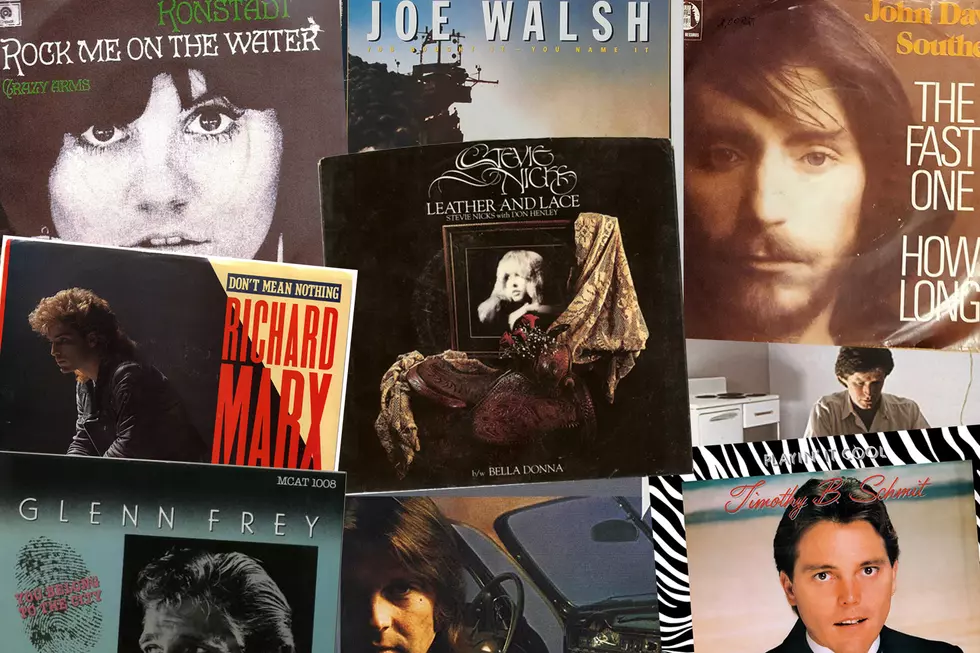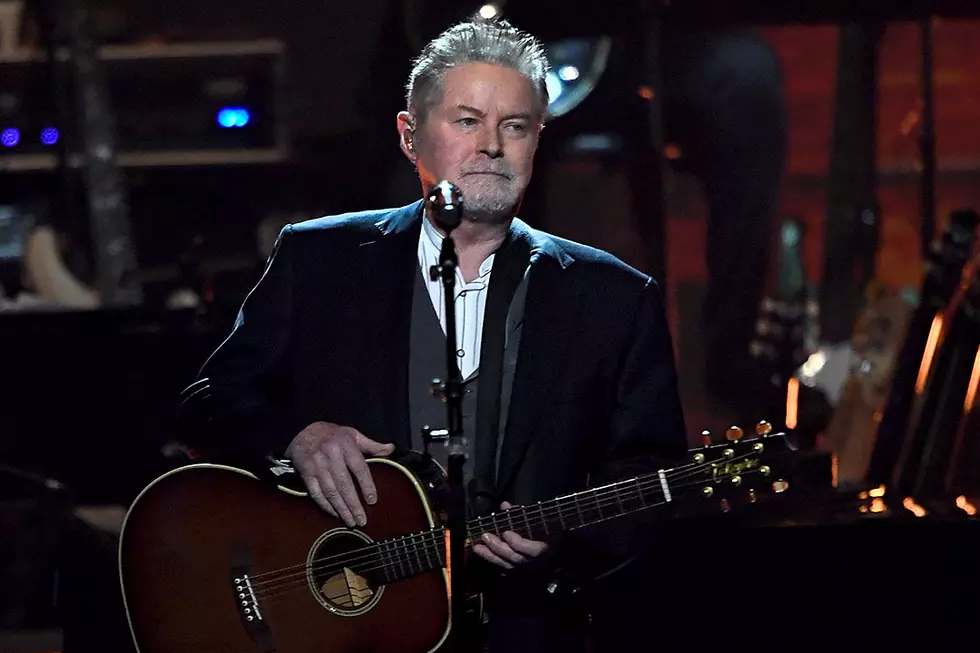
Almost Eagles: 10 Great Songs From Their Extended Musical Family
Casual fans tend to think of the Eagles as Glenn Frey, Don Henley and whoever they had backing them up from album to album.
It’s certainly true the pair ran the group, but the Eagles depended on every member to contribute. At the same time, they recruited a range of outside voices to help them strike gold - more so than almost any other first-tier rock band.
Almost Eagles: 10 Great Songs From Their Extended Musical Family looks at the band’s history, including collaborations on old friends’ albums and solo work that was more than just an Eagle flying by himself. Switch up the group’s story, have them form a year earlier or stay together deeper into the ’80s, and maybe the songs outlined below pop up somewhere in their catalog.
“Rock Me on the Water,” Linda Ronstadt, 1972
Before making her third, self-titled album, Linda Ronstadt was looking for a live band. She asked Frey to build the lineup, and he pulled in Henley to play drums. A few months later, guitarist Bernie Leadon and bassist Randy Meisner joined Frey and Henley as session musicians for the LP. You can hear the roots of the band’s shining folk-country-rock all over Linda Ronstadt. For that sweet AM Gold sound there’s nothing better than “Rock Me on the Water,” written by Eagles pal Jackson Browne, who also happened to co-write songs found on the band’s first three albums.
“The Fast One,” J.D. Souther, 1972
Outside of Frey and Henley, no one had more input into the Eagles' formative style than singer-songwriter J.D. Souther. Before the band formed, Frey and Souther lived and worked together. The pair hooked up with Henley on Linda Ronstadt sessions. The team minted platinum over and over again. Souther wrote or co-wrote a dozen Eagles songs over the years, including the hits “Best of My Love,” “Heartache Tonight” and “New Kid in Town." For a taste of his twang and high harmony vocals with Frey, there's “The Fast One” from his debut album, 1972's John David Souther.
“Black Rose,” J.D. Souther, 1976
J.D. Souther’s Black Rose packed in the guests. If you were part of the country-folk-rock scene in the ’70s, you probably sat in on this LP. Linda Ronstadt, David Crosby, Art Garfunkel, Little Feat mastermind Lowell George and guitarist Danny Kortchmar all showed up when Souther called. Most importantly, Frey, Henley and Joe Walsh join the party. The title track nails the mellow cool the band perfected, with Frey and Henley's vocals blending sublimely with Souther’s voice.
“Bad Man,” Randy Meisner, 1978
It’s no surprise “Bad Man” sounds like a Hotel California outtake. Meisner mostly played bass and sang harmonies in Eagles, but he also took lead and co-wrote a few key tracks. There’s no “Take It to the Limit” without him. Meisner left the band in the wake of the massively successful Hotel California album and tour; not much later, he issued his debut LP. The lead track, “Bad Man,” finds Meisner singing bar-band rock ‘n’ roll penned by old pals Frey and Souther. Had he stuck it out, “Bad Man” may have made it on The Long Run.
“Leather and Lace,” Stevie Nicks and Don Henley, 1981
By 1981, Eagles, one of the world's biggest bands, had just called it quits (at least until hell froze over). Fleetwood Mac, another of the world’s biggest bands, were in the middle of a breather to let Stevie Nicks and Lindesy Buckingham search for solo stardom. Nicks found it when Bella Donna hit No. 1 on the Billboard 200 and went quadruple platinum. Included on that album is one of rock’s great duets. Nicks penned "Leather and Lace," but the song's soft-rock magic could have easily slipped in between “I Can't Tell You Why” and “In the City” on The Long Run. Henley, who helped out on drums on the LP, found his own solo glory a year later with I Can’t Stand Still.
“Nobody's Business,” Don Henley, 1982
Henley’s first solo hit came with “Dirty Laundry,” but “Nobody’s Business” is the Almost Eagles track off I Can’t Stand Still. While both songs have similar leave-me-the-hell-alone lyrics, “Nobody’s Business” features less of a New Wave sound, centering more on a “Victim of Love”-style stomp. Henley wrote the song with J.D. Souther and Bob Seger, who also had a part in influencing the Eagles' sound; he co-wrote the No. 1 hit “Heartache Tonight” and the B-side “Funky New Year.” "Nobody's Business" could have easily fit on a Seger album from the era.
“Told You So,” Joe Walsh, 1983
If you're among those who gets furious when a radio DJ cuts off the epic guitar duel between Joe Walsh and Don Felder at the end of “Hotel California," then you'll probably really like "Told You So." The Spanish-guitar sound isn't on this solo Walsh cut from You Bought It – You Name It, but there are some real fireworks. Written by Walsh and Felder and featuring another superb guitar battle, the song shows off the pair’s sleazy side. It’s more Aerosmith than “Peaceful Easy Feeling.”
“Tell Me What You Dream,” Timothy B. Schmit, 1984
When Eagles bassist Timothy B. Schmit set out on his own, he didn’t go far without reaching out to his Southern California friends. Henley and Walsh show up on the LP, and Schmit wrote Playin' It Cool's title track with Josh Leo, Vince Melamed, and, yep, you guessed it, J.D. Souther. The album mostly skips the country and folk influences and leans on the New Wave touches found on his former bandmates' solo records. “Tell Me What You Dream” is nearly a rewrite of “I Can’t Tell You Why,” the only Eagles hit he took lead on. Still, it's hard to resist the slick shine of the familiar rhythm, keyboards and impassioned vocals.
“You Belong to the City,” Glenn Frey, 1985
Songwriter Jack Tempchin was the band’s go-to guy for help when J.D. Souther wasn't available. He wrote “Peaceful Easy Feeling” and co-wrote “Already Gone” plus a few others. Tempchin helped power Frey’s solo career by working with him for a decade. They wrote “You Belong to the City” specifically for Miami Vice; the song helped push the show’s soundtrack to No. 1. The sax solo is very ’80s, but the track fits the aesthetic Eagles had zeroed in on at the close of the ’70s. Maybe that’s why the band played it live for years and included it on the Farewell Tour I: Live From Melbourne DVD in 2005.
"Don't Mean Nothing,” Richard Marx, 1987
Eighties ballad king Richard Marx is a huge Eagles fan and thought “Don’t Mean Nothing” could have landed on The Long Run ... if he was born a decade earlier. He's got a point: That guitar riff nods to “Life in the Fast Lane,” and the swagger recalls both “In the City” and “Heartache Tonight.” Three Eagles even show up on the song: Walsh plays slide guitar, and both of their bassists, Meisner and Schmit, sing the background vocals.
Eagles Album Art: The Wild Stories Behind Their Famous LP Covers
More From Ultimate Classic Rock









